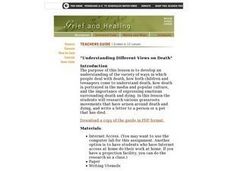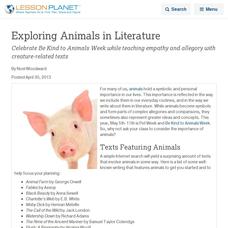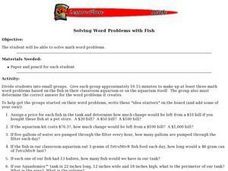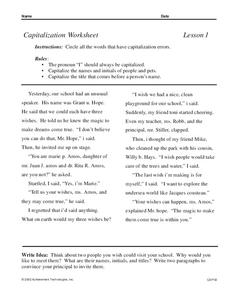Curated OER
Around the World
Students explore ways people from around the world are like them. They discuss how geography affects the way people live and work and how culture affects a person's day to day life. Students give a presentation over a chosen country to...
Curated OER
Citizen Me
Fifth graders examine what it means to be a citizen. Using the Constitution, they discover the functions and purpose of government. They compare and contrast the difference between a democracy and a monarchy. As a class, they discuss...
Curated OER
Why Do We Have Thanksgiving?
Pupils investigate the change in the Thanksgiving holiday over time. They research the Native Americans and Pilgrims to find out how their relationship affected the holiday. They create a PowerPoint presentation using digital cameras...
Curated OER
Getting Up the Nerve
Students examine the basics of the nervous system through an interactive program. They discover how the brain is linked to muscle movement. They can test cells through the interactive program to see how it reacts to different stimuli.
Curated OER
Understanding Different Views on Death
A thought-provoking lesson presents how different cultures view death. Upper elementary through high school pupils engage in a series of activities that will leave them with a new understanding of how death is dealt with globally....
Curated OER
¿Tú o Usted?
In English, we only have one word that means you, but in Spanish, speakers can use either tú or usted. Print this sheet for your beginning speakers to introduce them to this idea. First, read through the information provided, and then...
Curated OER
Exploring Animals in Literature
Celebrate Be Kind to Animals Week while teaching empathy and allegory with creature-related texts
Curated OER
Writing Connections: Link Writing to Pupils' Daily Lives
Engage your learners in writing a set of instructions that relates to their experiences.
Curriculum Corner
November Bell Ringers
All things November in a set of 32 bell ringer ideas to get you through the month. From writing about November to writing about colors and feelings in fall, these bell ringers are fun and allow creative writing practice.
Curriculum Corner
Wonderful Words for Writing!
Twenty slides make up a set of festive, May-themed writing prompts designed to grab scholars' attention and warm-up their writing skills. Prompts include story starters, holidays, research questions, the five senses, and more!
Curated OER
Solving Word Problems with Fish
Send your class fishing...for the right answers! Small groups collaborate to create math word problems based on the fish in their classroom aquarium or on the aquarium itself. After all groups determine the answer for their ownproblem,...
Curated OER
Possessive Adjectives
This worksheet contains clear information on possessive adjectives. After explaining what a possessive adjective is in English, there's a chart for learners to complete to identify the Spanish equivalent of words like my, your, his, etc....
Bulgarian Creative Writing Competition
Creative Writing Prompts For Every Season and Month
Winter, spring, summer, and fall! Every season is covered in a 14-page list of writing prompts. Included are story starters, reflection questions, poetry topics, and more.
Cornell Lab of Ornithology
Investigating Evidence
Explore the scientific process through nature. Scholars become scientists as they develop a question, design an experiment, collect data, and analyze their results. A two-week lesson guides your classes through the process and provides...
Curated OER
Tu o Usted? Explanation and Worksheet 1
What is the difference between using tú or usted? This worksheet provides a thorough, clear explanation, and there's an opportunity to practice. The exercise lists different people and asks the learner to identify whether...
Curated OER
Letter of Complaint
Learners analyze this letter of complaint to the city council by answering nine short-answer questions. They examine author's purpose, word choice, claims, rhetorical questions, and general observations. There is a focus on constructive...
Great Schools
Letter of Complaint
If you've ever received bad service or disagreed with a company's decision, writing a letter of complaint might be a good skill to have. Review the format of a letter, author's purpose, and other aspects of persuasive writing with an...
Achievement Technologies
Language Arts Worksheets
Looking for some quick grammar warm-ups? What about handy spelling crossword puzzles? Find everything you need with a resource that contains practice worksheets for parts of speech, parts of a sentence, common grammatical errors, tricky...
Poetry4kids
How to Write a Clerihew
Writing funny poems is the best part about learning poetic forms! Young poets learn all about clerihews—humorous four-line poems about people—with an explanatory lesson.
Curated OER
Caring for a Dog
In this dog worksheet, students learn about how to care for and feed a dog. They discuss the differences between big dogs and small dogs and complete an activity in which they portion out biscuits for two different dogs.
Curated OER
Bringing Animal Issues into the Classroom: César Chávez
Fifth graders get critical and political while they begin thinking about human and animal rights in relation to the US Constitution. This hand out includes answers to several questions regarding Cesar Chavez and his work to secure rights...
Curated OER
Books for Teaching "All About Me!"
Students learn about experiences and feelings through books. In this lesson, students read a variety of books to aid in their understanding of life. Through a listing and brief synopsis of twelve books, students explore feelings,...
Curated OER
My Secret War: Lesson 5
Fifth graders determine how freedom comes with rights and responsibilities through literature and poetry about World War II. In this World War II lesson, 5th graders use the letters in the word "infamy" to write an acrostic poem. They...
Curated OER
Introduce Vocabulary: Franklin's New Friend
The story Franklin's New Friend contains three tier-two vocabulary words! Your class reads the story, identifies the vocabulary words, and then works to construct their meanings. The new words are recorded either in a journal entry...

























